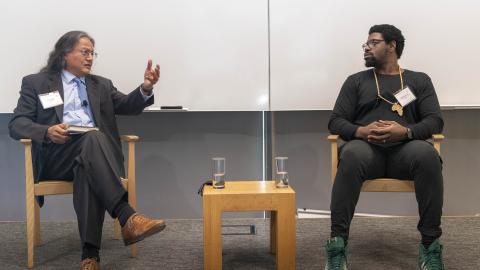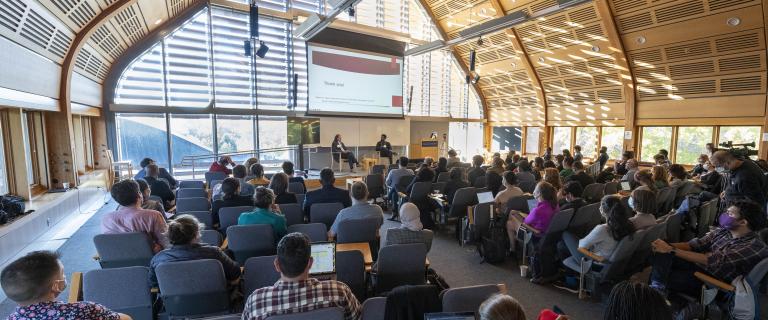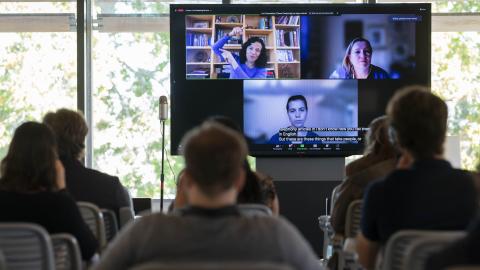


What will happen to the legal rights of the more than 200 million people who are likely to become climate refugees by 2050? How can we ensure that natural climate solutions are based on the input and knowledge of local Indigenous peoples? How do countries transition to renewable energy in equitable ways when many of their citizens lack access to existing energy sources?
These issues were at the center of panel discussions earlier this month at the Yale Center for Environmental Justice’s annual Global Environmental Justice Conference. The conference brings together scholars, practitioners, and activists from around the world and across disciplines to discuss how scholarship, social justice, and environmental management can be effectively integrated.
Here are the key takeaways:
‘Who gets the money?’
In a keynote address moderated by YSE Professor Gerald Torres, Olúfẹ́mi Táíwò, professor of philosophy at Georgetown University, spoke about the idea of redistribution, which is the focus of his critically-acclaimed book "Reconsidering Reparations." Reparations, Táíwò argues in the book, “should be viewed as a world-making project, and as such requires climate justice.”
“We could think of our global political system as being a distributor system. Capitalism is not just a production system, but it's also a distributor system,” said Táíwò. “It distributes things in ways that match hierarchies of inequality, unfairness, and injustice. Advantages tend to accumulate in the countries and in the communities that are most closely tied to yesterday's injustice.

“Disadvantages accumulate in the Global South, racially disadvantaged communities, Black and Indigenous communities. And we see this at multiple scales of analysis, whether we're looking within countries, or whether we're comparing countries.”
Táíwò says defining reparations is the way the world should tackle the climate crisis because, ultimately, redistributing wealth and power is the crisis. “Perhaps our natural systems are, of course, going to play a role, but ultimately what will be decisive are our political systems — in particular, what distributive decisions they make.”
Confronting land loss
While more than 200 million people across 50 nations and six world regions are likely to become climate refugees by 2050 — including 50 million fleeing their own countries — there are no legal frameworks to define a refugees’ loss of their national homelands or their sovereignty in new locations.
Much of the discussions by global leaders has focused on financial loss and damage, as well as climate adaption and mitigation. Yet, the magnitude of resettlement in the coming decades will challenge the very definition of refugee and asylum laws, said Sumudu Atapattu, director of the University of Wisconsin Law School’s Global Legal Studies Center, who spoke on the Legal Dimensions of Climate Migration panel.
Listening to Indigenous peoples
Too many climate solution programs are imposed on local communities, and some of these programs may not be meeting any of their needs, members of a panel focusing on nature-based climate solutions and Indigenous rights stated. Natural climate solutions need to be based on the input and knowledge of local Indigenous peoples, who must be consulted from the very beginning of a climate action plan.
“We need to listen,” said Indigenous geographer Fredy R. Grefa, professor at the Universidad San Francisco de Quito. Climate policy leaders need to work with the Indigenous community members to see what they need, what they think, and what their proposals are.
How food security overburdens women
Speaking at a panel on the global food system, Ann Vaughan, senior advisor for climate change at USAID’s Bureau for the Resilience and Food Security, said that as more groups are coming together to respond to the ways in which the COVID-19 pandemic and new global conflicts have impacted the food system, it is important that their proposed solutions come from a gendered lens.

Oftentimes, she said, the work of restoring food security places heavier burdens on women, and factoring that in will create a more balanced and efficient approach to repairing that security.
Preserving culture in the face of climate change
Andrea Richards, an author and climate activist from Barbados, spoke extensively about her experience watching her island homeland bear the brunt of the climate crisis. She said that the urgency of finding economic and political solutions leaves little room for the consideration of people’s cultural heritage — a major concern in her home country.
However, Richards says that tailoring solutions to best fit the culture of the people being impacted is absolutely crucial to the success of climate mitigation and adaption efforts moving forward, and that by implementing these culture preservation measures, countries like Barbados can serve as a model for adequately addressing the climate crisis as it worsens.
Photos by Mark Conrad